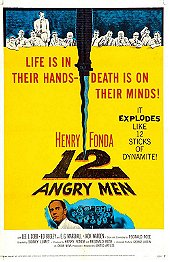A dissenting juror in a murder trial slowly manages to convince the others that the case is not as obviously clear as it seemed in court.
Henry Fonda: Juror #8
12 Angry Men is obviously one of the best films in existence. It is proof that, for a film to be great, it does not need extensive scenery or luscious locations, elaborate costumes or fancy effects, merely perfect acting all in one room.
The twelve angry men are the twelve jurors of a murder case. An eighteen-year-old boy from a slum background is accused of stabbing his father to death and faces the electric chair if found guilty. Eleven of the men believe the boy to be guilty, only one man(Henry Fonda) has doubts. Can he manage to convince the others as well?

The court case provides only a framework, however. The film's greatness lies in its bringing-together of twelve different men who have never met each other before and the interaction of their characters as each man brings his own background and life experiences into the case. Thus, we have the hesitant football coach (Martin Balsam), the shy, uncertain bank clerk (John Fiedler), the aggressive call company director (Lee J. Cobb), the authoritative broker (E.G. Marshall), the self-conscious slum dweller (Jack Klugman), the solid, dependable painter (Edward Binns), the selfish salesman (Jack Warden), the calm, collected architect (Fonda), the thoughtful, observant older man (Joseph Sweeney), the racially bigoted garage owner (Ed Begley), the East European watchmaker (George Voskovec) and the beefcake advertising agent (Robert Webber) who has plenty of chat and little else.
Juror #10: Bright? He's a common ignorant slob. He don't even speak good English.
Juror #11: Doesn't even speak good English.
Almost the entirety of the film, takes place in merely one room, the jury room, where the men have retired to consider their verdict. The viewer finds him or herself sweating it out with the jury as the heat rises, literally and metaphorically, among the men as they make their way towards their final verdict. Interestingly, the jurors (apart from two at the end) are never named. They do not need to be. Their characters speak for themselves.
Henry Fonda is eminently suitable and excellently believable as the dissenter who brings home the importance of a jury's duty to examine evidence thoroughly and without prejudice. Joseph Sweeney is delightful as Juror No. 9, the quiet but shrewd old man who misses nothing, whilst E.G. Marshall brings his usual firmness and authority to the role of Juror No. 4. All the actors shine but perhaps the best performance is that of Lee J. Cobb as Juror No. 3, the hard, stubborn, aggressive, vindictive avenger who is reduced to breaking down when forced to confront the failure of his relationship with his own son.
Several of the stars of '12 Angry Men' became household names. Henry Fonda continued his distinguished career until his death in 1982, as well as fathering Jane and Peter. Lee J. Cobb landed the major role of Judge Henry Garth in 'The Virginian'. E.G. Marshall enjoyed a long, reputable career on film and t.v., including playing Joseph P. Kennedy in the 'Kennedy' mini-series. Jack Klugman was 'Quincy' whilst John Fiedler voiced Piglet in the 'Winnie The Pooh' films and cartoons.
''One man is dead. Another man's life is at stake. If there is a reasonable doubt in your minds as to the guilt of the accused, a reasonable doubt, then you must bring me a verdict of Not Guilty. If, however, there's no reasonable doubt, then you must, in good conscience, find the accused Guilty.''
Oscar-winning cinematographer Boris Kaufman focuses in on the heart of what director Sidney Lumet and writer Reginald Rose are attempting to convey to the audience through the brilliant acting of all concerned. Watch as the jurors vote to make it six to six. The camera hones in for just the right lighting, facial expression, and angle to show the anguish and torment in the souls of these twelve angry men. It flashes to the key juror #8(Fonda) from time to time at just the right moment for the full effect of his deep conviction that the eighteen year old should have a fair consideration of all the evidence to prove beyond a reasonable doubt that he is guilty of killing his father. The use of shade and shadow, especially when the thunder storm crackles outside is used to show the tempest that rages inside the jury room. The heat that eventually makes even juror #4(Marshall) sweat, complements the pressure of the arguments and debates the atmosphere throughout the single room.
Twelve Angry Men is actually based upon a television play. These were transmitted live back in the 1950s because the video tape didn't exist back then, so we can speak of theater. The movie itself has very much the same feel to it. I like the interactiveness between the actors and the modern theater performance, used back then. In recent movies we can see all too often an actor caring about his/her facial expressions when filmed and caring about the voice at the studio dubbing stage. In this film everything, you see and hear looks 100% natural.
I am especially overwhelmed by the values transmitted by the main characters. Honest Hank (Henry Fonda) is of course the most likeable character. E.G. Marshall stands out as well. But it's the great, late Lee J. Cobb who runs away with the movie in his final scene. Very powerful.
All this is simultaneous with a musical score by Kenyon Hopkins that matches mood to action in a perfect blend of all essential elements making this one of the best Hollywood films ever.
10/10
 Login
Login